|
|
|
Sort Order |
|
|
|
Items / Page
|
|
|
|
|
|
|
| Srl | Item |
| 1 |
ID:
163237


|
|
|
|
|
| Summary/Abstract |
Recent scholarship posits that the resource curse has gendered as well as economic effects on oil-rich economies, like those in the Middle East and North Africa, entrenching paternalistic relationships that disadvantage women’s entry into the labor force. Upon closer examination, however, it appears that oil may not be the most compelling argument to explain Arab women’s low presence in the workforce –– especially since women’s labor-force participation within the oil rich Gulf Cooperation Council (GCC) states is generally higher than the regional average. We contend that this is, in part, a byproduct of the countries’ labor nationalization policies. Our analysis suggests that oil-driven development can in fact boost female labor force participation, revealing that rentierism as experienced in the GCC can actually have positive externalities for women
|
|
|
|
|
|
|
|
|
|
|
|
|
|
|
|
| 2 |
ID:
095085
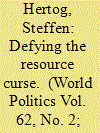

|
|
|
|
|
| Publication |
2010.
|
| Summary/Abstract |
The article explains how several Gulf rentier monarchies have managed to create highly profitable and well-managed state-owned enterprises (SOEs), confounding expectations of both general soe inefficiency and the particularly poor quality of rentier public sectors. It argues that a combination of two factors explains the outcome: the absence of a populist-mobilizational history and substantive regime autonomy in economic policy-making. The authors concludes that it is necessary to rethink the commonly accepted generalizations both about rentier states and, arguably, about public sectors in the developing world.
|
|
|
|
|
|
|
|
|
|
|
|
|
|
|
|
| 3 |
ID:
184427
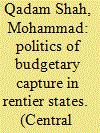

|
|
|
|
|
| Summary/Abstract |
The literature of fiscal federalism suggests two approaches to explaining the allocation of intergovernmental transfers. First, a normative approach that considers governments as benevolent social planners pursuing normative criteria of efficiency and equity; and second, a public choice approach assuming governments as self-maximizing actors who use intergovernmental transfers to purchase political capital, enhancing their chances of re-election. This paper seeks to test the hypotheses of these two approaches to explain the allocation of discretionary development budget among Afghan provinces during three fiscal years of 2016–17, 2017–18 and 2018–19. Findings indicate Afghanistan’s central government’s approach does not focus to achieve normative criteria of improved participation, predictability, transparency, and equity. Instead, Its central government considers certain political criteria such as political affiliation – ethnic affiliation and alignment with central government policies – political importance, and strength and weakness of local actors. This paper relies on both quantitative and qualitative data to support its arguments.
|
|
|
|
|
|
|
|
|
|
|
|
|
|
|
|
| 4 |
ID:
104442
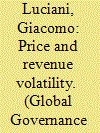

|
|
|
|
|
| Publication |
2011.
|
| Summary/Abstract |
Price volatility is a major problem for all commodity exporters because it translates into direct or indirect volatility of government revenue. Should a developing country's state be responsible for isolating the domestic economy from the consequences of fluctuating international commodity prices? This article argues that this is an essential function of the state and a crucial component of its legitimacy. Recently, the establishment of stabilization funds has been regarded as an essential component of good governance, notwithstanding the persistence of major problems. As an alternative, this article proposes the use of resource revenue for establishing endowments of autonomous public institutions with well-defined developmental goals, or furnishing the equity for strategically important commercial corporations. The latter opens the door to an interesting perspective on the potential path toward progressive democratization of the rentier states.
|
|
|
|
|
|
|
|
|
|
|
|
|
|
|
|
| 5 |
ID:
176810
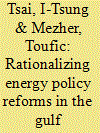

|
|
|
|
|
| Summary/Abstract |
The Gulf Cooperation Council (GCC) states are undertaking a number of energy policy reforms to cope with challenges from geopolitical tension and oil revenue depletion. These reforms are, however, different from those implemented in the western world for post-oil transition. This paper analyzes post-reformed state control over energy assets and energy transactions to provide an institutional view on the rationality of GCC's unique reform approach. Our study shows persistent but re-programmed state dominance over the energy sector, with energy assets owned either by national oil companies, non-oil state-owned enterprises, or public-private-partnership (PPP) agents with state ownership; and energy transactions governed either by state regulation or PPP contracts in the absence of any market mechanism. This institutional setting may allow the authority to sustain the legacy rentier social contract by expanding state-controlled rent source from oil to non-oil revenue and replacing low-power energy subsidy with high-power state-provided jobs as the rent for transfer. This institutional motivation will ultimately jeopardize market-based reforms and large-scale carbon regulation in the region. We elaborate the theoretical implications and discuss near-term development of GCC's energy policy reforms under the institutional-alignment constraints.
|
|
|
|
|
|
|
|
|
|
|
|
|
|
|
|
| 6 |
ID:
171905
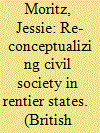

|
|
|
|
|
| Summary/Abstract |
Civil society is typically understood as weak or irrelevant in Gulf rentier states, the assumption being that rent-derived wealth allows the state to co-opt or repress associational life. However, for all these claims about the relationship between rents and civil society, rentier state theory relies on a number of assumptions regarding the nature of civil society itself, specifically that civil society is, by definition, independent of the state, formal and public in organization, and pro-democratic in orientation. This article examines where relaxation of these assumptions allows us to better understand the political activities of civil society groups in Gulf rentier states, even as co-optative and repressive governance tactics continue to limit space for political activity. Instead of focusing on traditional forms of civil society, we should instead search for those parts of Gulf society that fulfil the function of civil society in terms of societal entities that act collectively to pursue a political purpose (including both engagement with the state over policy matters and debates on moral and social societal norms).
|
|
|
|
|
|
|
|
|
|
|
|
|
|
|
|
|
|
|
|
|